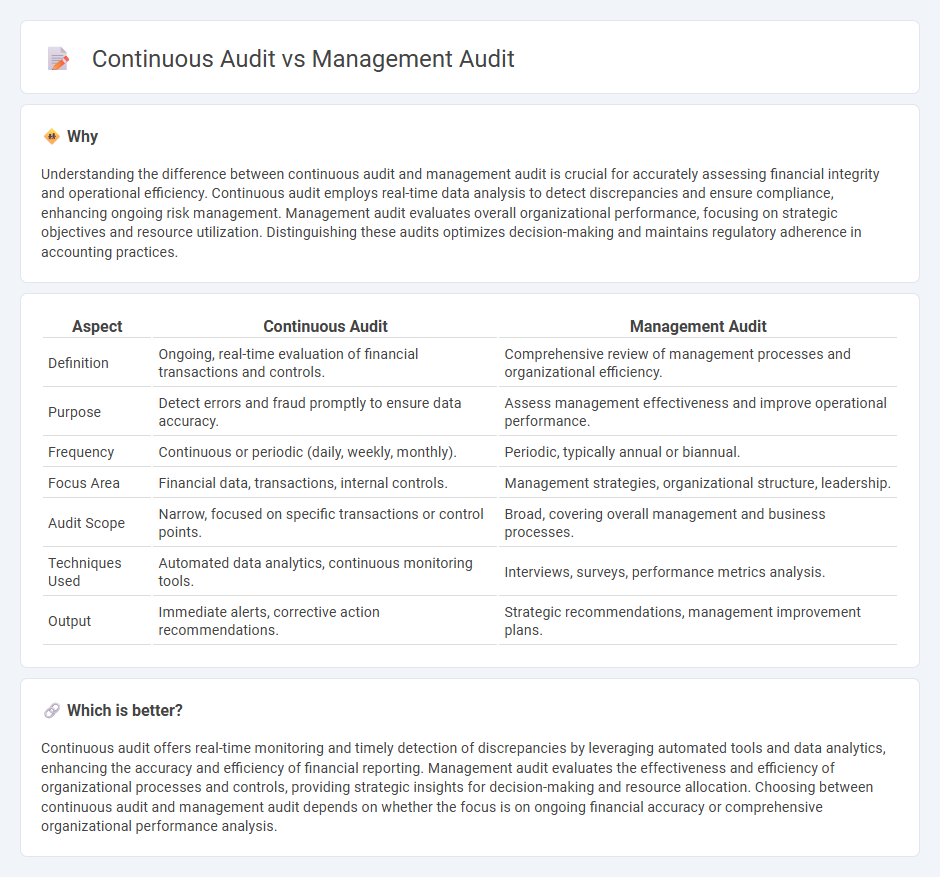
Continuous audit utilizes automated tools and real-time data to provide ongoing assurance and immediate detection of discrepancies in financial records. Management audit evaluates an organization's internal controls, efficiency, and compliance to enhance operational effectiveness and strategic decision-making. Explore the differences and benefits of continuous audit versus management audit for optimized financial oversight.
Why it is important
Understanding the difference between continuous audit and management audit is crucial for accurately assessing financial integrity and operational efficiency. Continuous audit employs real-time data analysis to detect discrepancies and ensure compliance, enhancing ongoing risk management. Management audit evaluates overall organizational performance, focusing on strategic objectives and resource utilization. Distinguishing these audits optimizes decision-making and maintains regulatory adherence in accounting practices.
Comparison Table
| Aspect | Continuous Audit | Management Audit |
|---|---|---|
| Definition | Ongoing, real-time evaluation of financial transactions and controls. | Comprehensive review of management processes and organizational efficiency. |
| Purpose | Detect errors and fraud promptly to ensure data accuracy. | Assess management effectiveness and improve operational performance. |
| Frequency | Continuous or periodic (daily, weekly, monthly). | Periodic, typically annual or biannual. |
| Focus Area | Financial data, transactions, internal controls. | Management strategies, organizational structure, leadership. |
| Audit Scope | Narrow, focused on specific transactions or control points. | Broad, covering overall management and business processes. |
| Techniques Used | Automated data analytics, continuous monitoring tools. | Interviews, surveys, performance metrics analysis. |
| Output | Immediate alerts, corrective action recommendations. | Strategic recommendations, management improvement plans. |
Which is better?
Continuous audit offers real-time monitoring and timely detection of discrepancies by leveraging automated tools and data analytics, enhancing the accuracy and efficiency of financial reporting. Management audit evaluates the effectiveness and efficiency of organizational processes and controls, providing strategic insights for decision-making and resource allocation. Choosing between continuous audit and management audit depends on whether the focus is on ongoing financial accuracy or comprehensive organizational performance analysis.
Connection
Continuous audit and management audit are interconnected through their focus on enhancing organizational controls and risk management. Continuous audit provides real-time data and insights, enabling management audits to evaluate operational efficiency and compliance more effectively. This integration supports proactive decision-making and timely identification of financial discrepancies.
Key Terms
**Management Audit:**
Management audit evaluates the effectiveness, efficiency, and compliance of an organization's managerial processes, focusing on decision-making, resource utilization, and overall governance. It encompasses strategic analysis, risk management, and organizational structure to ensure alignment with business objectives and regulatory requirements. Explore in-depth insights on how management audits drive organizational improvement and accountability.
Efficiency Evaluation
Management audit evaluates organizational efficiency by examining policies, procedures, and resource utilization to ensure alignment with strategic goals. Continuous audit leverages real-time data analysis and automated tools to provide ongoing efficiency insights, enabling prompt corrective actions. Explore how these audit types enhance operational performance and decision-making effectiveness.
Decision-making Process
Management audit evaluates the effectiveness and efficiency of the decision-making process by analyzing organizational policies, control mechanisms, and managerial performance at specific points in time. Continuous audit employs real-time data monitoring and automated controls to provide ongoing assurance, allowing faster identification and correction of decision-making errors. Explore how integrating both audits can optimize decision-making accuracy and organizational performance.
Source and External Links
Management Auditing - A systematic examination of management decisions and actions to analyze performance and effectiveness.
Management Audit: Meaning, Features, Objectives, and Uses - A thorough examination of an organization's managerial policies and procedures to identify areas for improvement.
What is a Management Audit? - A process to determine the effectiveness of a company's management team and provide recommendations for improvement.
 dowidth.com
dowidth.com